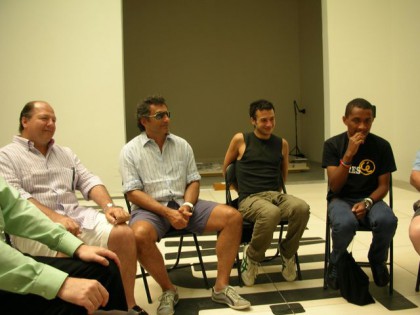SHIPWRECK/ This post is in English
The group of four young Italians stared for a long while to the written notes placed at the border of the stage, at the Spanish pavilion in Venice, to inform the public about what was to come.
-” There is an open discussion, we can take a seat and participate.”
– “Bfff, Why bother? it is intellectual bullshit.”
Intellectual bullshit. My dear public, the dear public thinks this is intellectual bullshit no doubt.
Charles Filch was positively hurt by such words. How could they call “intellectual bullshit” a discussion lead by a man (Charles Filch) so far, so far away from intellectualism, and from bullshit for that matter?
Charles Filch tells me here to correct; he is an intellectual int he following sense:
A person of high mental calibre and applied mental agility that can inductively or deductively reason from evidence and patterns, with the creativity to “think outside the box“.
(see http://en.wikipedia.org/wiki/Intellectual)
Yes, that is Charles. High mental calibre, applied mental agility, and certainly thinking outside the box.
It is so easy to be subversive nowadays (it is enough if you think, or if you walk aimlessly in the city -without wanting to buy something) and it is so easy to be intellectual (it is enough if you speak more than two languages and if you read books with letters smaller than 3 mm). So Charles Filch, nor subversive nor intellectual, looked at how the very different types of people, the very varied audience, took their places on the chairs placed on the stage, to begin with “an open discussion about art and the Biennale”.
Many different people: a child of twelve who wanted to be an Engineer, a Chinese lady, a German mathematician (from Munich), a Swiss diplomat, an Antillean art student, two ladies from new York, a Brazilian engineer who did not for a moment take off his sunglasses and a Brazilian gallerist…
When seen all together, one had to think of these movies where a boat shipwrecks, ( or any other disaster movie/ situation: nuclear catastrophe,earthquake, or flood) and as a result people from complete different backgrounds have to survive together. This is how the stage looked that morning, and it was only thanks to Charles Filch that some understanding came from such a varied company.
This is the Venice Biennale, people from all types, people who make you disbelieve the old cliche saying that contemporary art does not have the favor of a non-specialized audience (an assertion that collapses here -everyone comes and everyone is happy to be here, even if only to show their disgust at the exhibits). So this is, indeed a micro-cosmos.
What was discussed there – and I can say, with passion?
1- Are you born as an artist – or a manager, or a cook – or is what you become a matter of (self)education? – The very nice Chinese lady ended this point with following, puzzling, statement: “Well, yes, you may not have to be born a cook or a manager to be one, but you certainly have to be born to be a top-one” (top manager, top cook – does the reasoning apply to top, and just average, artists?- we did not reach an agreement).
2- Do the sponsors nowadays have enough respect for the original ideas behind an artwork or a building they own? – this question was raised by the sponsoring of Hugo Boss in the United States pavilion, or the enormous commercial prints covering whole buildings in Venice.
3- What role did the digital revolution play in the democratization of the arts?- are we finally, at the end, at the “Jeder ist ein Künstler”?? And why such a statement produces so much panic in many people?? someone said : “if everyone is an artist and everything might be art, then we have a problem.” Really? which problem and for who?
4- Why are artists so critically and skeptically observed by the public? – this was raised by the very nice Chinese lady, who said that right now in Chinese forums, many Chinese people assert that is was Ai Wei Wei himself who provoked his own arrest, to increase the value of his work.
We will never know, but we talked about it and many people looked at us – the beautiful view of a shipwreck on stage.








0 Responses to “Shipwreck – a discussion with Charles Filch”